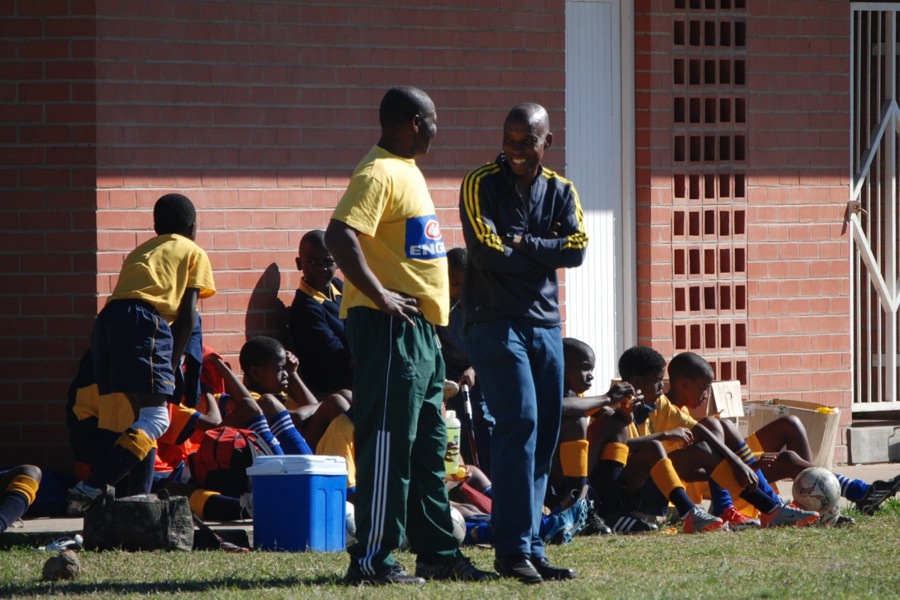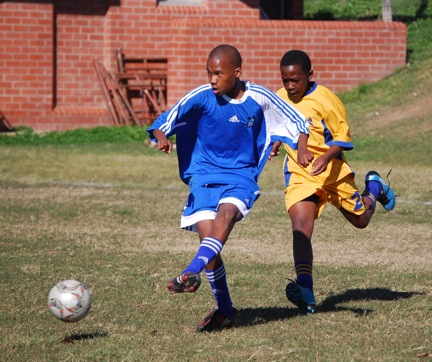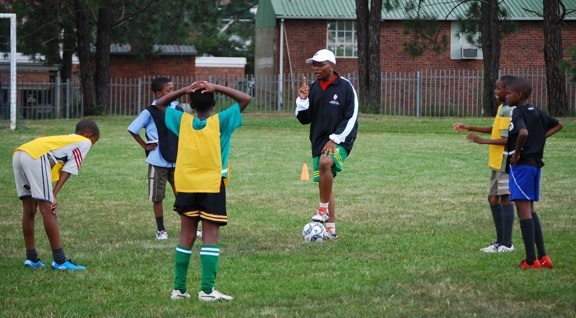2010 was the year of Africa’s first World Cup, a historic year for South Africa and for the continent. An hour west of Durban’s huge Moses Mabhida Stadium, in the KwaZulu-Natal hills, every weekday afternoon 46 boys train on a modest football ground at the University of KwaZulu-Natal in Pietermaritzburg. These 13-year olds symbolize the immense potential of grassroots football in South Africa.
In an atmosphere of quiet industriousness and positive support, the boys of the Izichwe Youth Football programme go through fitness routines, refine individual skills, and play small-sided games under the watchful eye of several local coaches.
Named after the regiment commanded by Shaka Zulu two centuries ago, Izichwe is a not-for-profit development program providing access to high-level football training and life skills instruction to black youth from the Pietermaritzburg area. Working on a shoestring budget, it helps to overcome enduring barriers to participation in sport for black youth in a democratic South Africa.
It has been an honor and a privilege for me to be part of Izichwe while a Fulbright Scholar at the University of KwaZulu-Natal. I am grateful to Thabo Dladla, Izichwe’s founding director, for warmly welcoming my family into this wonderful sporting community. One of my daughters joined Izichwe–the only girl and the youngest player by three years.
As our involvement with the program intensified, I realized that I had come full circle from my first visit to South Africa in 1993 as a young volunteer sports coach in Khayelitsha, a massive black township on the outskirts of Cape Town. Now I was here with my entire family and I got to rekindle and sharpen my coaching inclinations. I also gave occasional classroom lectures to the youngsters, prepared them for an oral history project, and helped with the year-end function (see video above).
There is something very special about Izichwe. Thabo Dladla, Mhlanga Madondo, “Styles” Mkhize, Patrick “Cutter” Mthembu, Xolani Madlala, Ronnie Chetty and Kristen Konkol provide specialized coaching and caring, constructive leadership. Their positive, non-authoritarian approach aims at unleashing the boys’ potential on and off the football pitch.
Izichwe’s approach is not so much about winning games and tournaments, but about teaching technical, tactical, psychological and physical skills that will serve the teenagers well down the road. This long-term vision of achievement can be tough on the boys. I have seen them lose against teams stacked with over-age players. A few years down the road it will be interesting to compare the achievements of the Izichwe boys with those of the over-age players.
To understand Izichwe is to appreciate how football is closely linked to the physical, intellectual and social growth and development of historically disadvantaged South African youth. Most players come from tough socio-economic circumstances and at Izichwe they learn sport’s values of teamwork, hard work, discipline, and achievement. The daily training routines provide needed structure to these student-athletes’ lives. In many cases, I have seen individuals acquire confidence, strengthen their self-esteem and self-awareness, and even improve their academic performance.
Next year I hope that a girls’ team will be up and running at Izichwe. It is important that the same opportunities offered to boys are also made available to girls. I am confident that a few years from now, many Izichwe veterans—male and female—will be representing their country and competing in top leagues. For those individuals who will opt for a career in something other than football, Izichwe will have empowered them with skills, knowledge and experience to become good citizens and community builders.
As I prepare to leave South Africa in a few days, I want to take this opportunity to thank my fellow coaches and the players at Izichwe. Their warmth, generosity and brotherhood will never be forgotten. This moving experience has reminded me of a German theologian’s response to a question about how to explain happiness to a child: “I wouldn’t explain it,” Dorothee Solle said; “I’d toss him a ball and let him play.”
Tag: youth
Race, Class and SA Football

‘Talking Football’ by Thabo Dladla (Echo, 5 August 2010)
The euphoria and excitement that grew around football during the recent World Cup are not likely to boost the beautiful game in South Africa. If our attitudes do not change towards this predominantly black sport, it will remain a stepchild of South African sport for many years to come.
Rugby and cricket will continue to receive support from businesses and decision makers. The black elites’ children attend private and formerly white high schools which promote rugby and cricket . . . [codes] which enjoy the best sporting facilities, all the way up to university level. The few facilities available to football are either poorly maintained or not maintained at all.
The system continues to support the rich and politically powerful. there are many black faces leading institutions such as schools, universities, municipalities and government departments, and yet football continues to struggle.
At university level rugby enjoys huge sponsorship and coverage on television while football [does] not despite the huge number of students who play the game . . . The young men and women in this age group should be competing in U20 and U23 competitions. The Izichwe Youth programme based at the University of KwaZulu-Natal strives to address some of the challenges faced by the needy youth.[The program receives support from Ilawu B.B., National Lottery, Metropolitan, Adidas and Viking Stavanger FC in Norway.]
The rich and powerful call for more police and prisons. Yet the country requires youth programmes to empower our youngsters socially, economically and academically, to shape their future. I would like to see a change in attitude from those who make decisions in government and business.
It is not only the rugby-playing children from middle class families who have dreams. Patriotism is not only about carrying flags and singing national anthems, it is more about caring and supporting your fellow citizens.
[Click to listen to podcast with Thabo Dladla and fellow coaches.]
After the World Cup: Football Again!

The 2010 World Cup in Disney-like FIFAland ended only seven days ago and since then South African columnists and cartoonists, corporate managers and car guards, compulsive fans and casuals alike have been vexed by the same post-World Cup question: what do we do now?
The immediate answer was stunningly simple. Back to the pitch! For me, that means training with the four dozen youngsters and the committed coaches of the Izichwe Youth Football program here in Pietermaritzburg. On Saturday, at the University of KwaZulu-Natal’s Peter Booysens sports ground, the teenagers played against the Durban (eThekwini) under-15 representative side due to compete in the ‘One Nation’ tournament in Bremen, Germany, in a few months.
Even though the visitors from the big city won, it was a glorious day for pure football. The illuminating pass, the righteous tackle, the crisp give-and-go, and the delicate chip shot over the keeper and into the back of the net. There will be time for improving team tactics and defensive organization. For now, let’s keep playing, learning, and giving Bafana Bafana hope for the future.
Talking Football in KwaZulu-Natal

Thabo Dladla is a highly committed youth coach and former professional player with AmaZulu FC. His weekly ‘Talking Football’ column in a Pietermaritzburg newspaper focuses on the game at the grassroots, not on the 2010 World Cup or the PSL. ‘There is something wrong when a country with over 48 million people and a huge football budget cannot produce good players,’ writes Dladla this week.
‘I still believe that our country has some of the best talent at U12 level but poor leadership is letting the youth down. We have too many politicians and sports leaders who are more interested in the benefits that can be gained for themselves, than the sport itself.
‘Post 2010 South African youth deserve better than what they are getting now. The transformation of football should be felt at the lowest of levels. We can no longer allow a situation where a few get fatter while the players continue to suffer.’